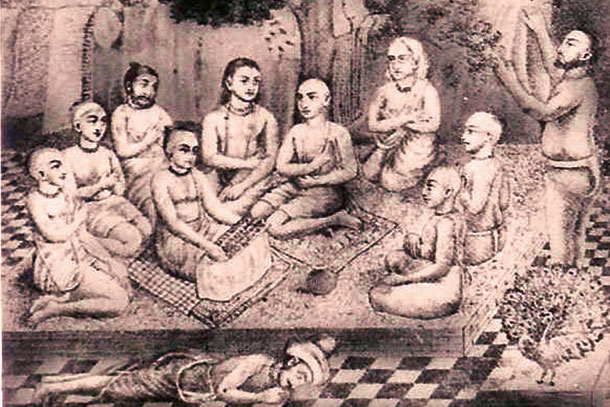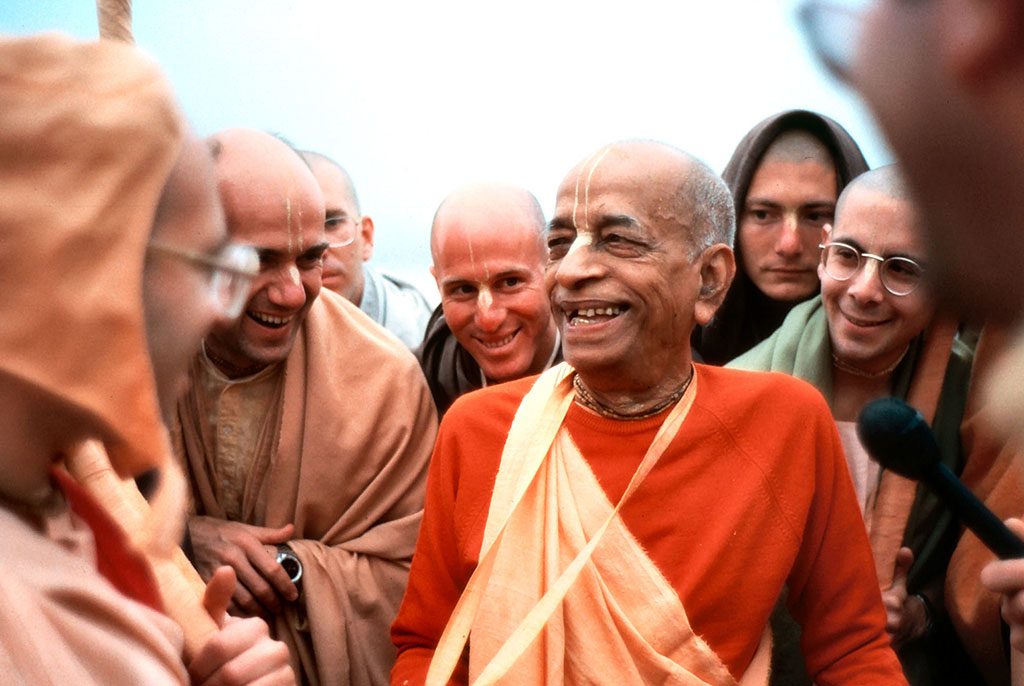Unlike our standard Bhakti Sastri course, which has six scheduled assessment periods, the evergreen Bhakti Sastri course allows the student to schedule the assessment at his/her own pace within the overall deadline for the entire course.
Course Summary
The Bhakti-sastri course is the official name for the study of the following six modules – Bhagavad-gita 1, Bhagavad-gita 2, Bhagavad-gita 3, The Nectar of Instruction, The Nectar of Devotion and Sri Isopanisad. Traditionally these courses can be studied individually or as a whole over a definite period of time. Asynchronous Bhakti Sastri allows you a more flexible approach to learn at your own pace and within a longer time frame. The course is presented systematically as per the traditional Bhakti sastri and in accordance with the twelve aims of sastric study such as bettering the knowledge of scriptures, deepening the understanding, enhancing one’s ability to preach, building and maintaining faith and conviction, etc.
Schedule
Asynchronous Bhakti Sastri is suitable for those devotees who desire to complete the Bhakti Sastri course in less than a year, or who due to their service/job/family commitments need more than a year (maximum 2 years) to complete the entire course. Unlike our standard Bhakti Sastri course, which has six scheduled assessment periods, the asynchronous one allows the student to schedule the assessment at his/her own pace within the overall deadline for the entire course.
So asynchronous learning is a type of learning that you undertake on your own schedule i.e., it takes place at different times for students enrolled in the same course. Because this system allows the student to study at their own convenience, it, therefore, does not include interaction between classmates nor with the teacher.
All lectures are pre-recorded and the students don’t need to be present online at a specific time but can watch the videos and study at their convenience. Students do need to set the time aside to dedicate to the course but it can be at the time that suits them.
A convenient feature of the lectures is that they are cut into small units dealing with one specific topic. So, whenever there is some free time, a student can use it to go through the topic, then continue with other activities and think about what has been said. This system is very practical for those who have busy lifestyles but it is also proving to be helpful for just anyone, helping to better focus on the most important points from the lectures.
Assessment
All assessment is done online, at a time convenient for the student.
Registration
Bhakti-sastri course can be attended without any special requirements. It is possible to enrol at any time and just study a module of choice.
You can enrol for individual courses one after another or according to your preference as they are all self-standing courses. You can also enrol immediately for the whole Bhakti-sastri course and get a 21% discount and access to one of three modules of your choice (Caitanya Caritamrita – Self Study, Bhagavata Purana – Self Study or Modern Hinduism – Self Study.)
By clicking the enrollment button, you’ll need to create a profile on BCOC – Bhaktivedanta College Online Campus (if you do not have one already) and proceed with the payment. Please note that registering for the entire Bhakti Sastri course won’t automatically grant you access to the modules. The student care service will manually add you to the course within 24-48 hours after payment.
While we recommend enrolling in the full Bhakti-sastri course for a complete and enriching learning experience, it is also possible to register for individual modules. Please note that individual module registration does not include additional discounts or the bonus modules listed above. To register, please click on the links below:
SELECTED COURSES
Career Dharma – ONLINE Self Study
The course gives a clear roadmap to people engaged in a spiritual process so that their spiritual practices will enliven their working time and their working time will enliven their spiritual practices, bringing them both meaningful prosperity and spiritual advancement, by applying at least two of the nine principles of Career Dharma, with a plan to go deeper over time.
Kirtan Course – CAMPUS
Learn to play the basics of karatalas, mrdanga and harmonium with experienced and seasoned Kirtan-practitioners

Art Course: Krishna in watercolour with Radhe Gendron – CAMPUS
In the Art Course: Krishna in Watercolor (English/French), we will explore the art of painting Krishna Balarama, animals of Vraja, and backgrounds. This course is perfect for painters of all levels who want to perfect or learn more about painting Krishna with watercolour. Whether you're a seasoned painter or just starting, this class welcomes all skill levels. The minimum age requirement is 13 years, and beginners are particularly encouraged to join.
Modern Hinduism – ONLINE Self Study
This module focuses on the transformations of Hinduism during modernity and late modernity while covering, as background, the development of Hinduism and the bhakti movements during the Islamic rule. Central to our historical approach will be attention to the growth and development of Gaudiya Vaishnavism.
Caitanya Caritamrita – ONLINE Self Study
The Caitanya Caritamrita module aims to provide an understanding of important themes, historical context, structure and content of the Caitanya Caritamrita, enabling a fuller appreciation of the text and greater access to reading and relishing it in the light of personal and institutional practice.
Bhagavata Purana – ONLINE Self Study
This module takes the Bhagavata Purana, sacred literature foundational to the Vaishnava tradition and approaches it from several different angles, including the contemporary scholarship. Such an approach fosters our attempts to understand the Bhagavatam as something to be presented to others in the wider world, in the contemporary world.
Evergreen Bhakti Sastri Course – ONLINE
Unlike our standard Bhakti Sastri course, which has six scheduled assessment periods, the asynchronous one allows the student to schedule the assessment at his/her own pace within the overall deadline for the entire course.
Thematic Bhagavad Gita – ONLINE Self Study
Bhagavad-gita is a widely read scripture that for centuries has been considered the heart of India’s timeless wisdom. In this course, we will explore the five main themes of the Gita – the self, matter, action or karma, time, divinity – and get some new insights into the mysteries of life!
Yoga Philosophy – ONLINE
The Yoga Philosophy course invites students to cultivate a meaningful understanding of yoga, providing a strong foundation for a lifelong practice both on and off the mat. Throughout the course, we explore six major topics, studying the principles of traditional yoga while embarking on a journey of self-discovery.
ISKCON Disciple Course – ONLINE Self Study
ISKCON Disciple Course is a training program that deepens devotees' understanding of guru tattva within the multiple guru environment of ISKCON. Designed for new devotees preparing to take initiation, the course is also recommended for leaders, preachers, and educators in ISKCON.
Sign Up For Bhaktivedanta College Newsletter. Be with us & join now.









